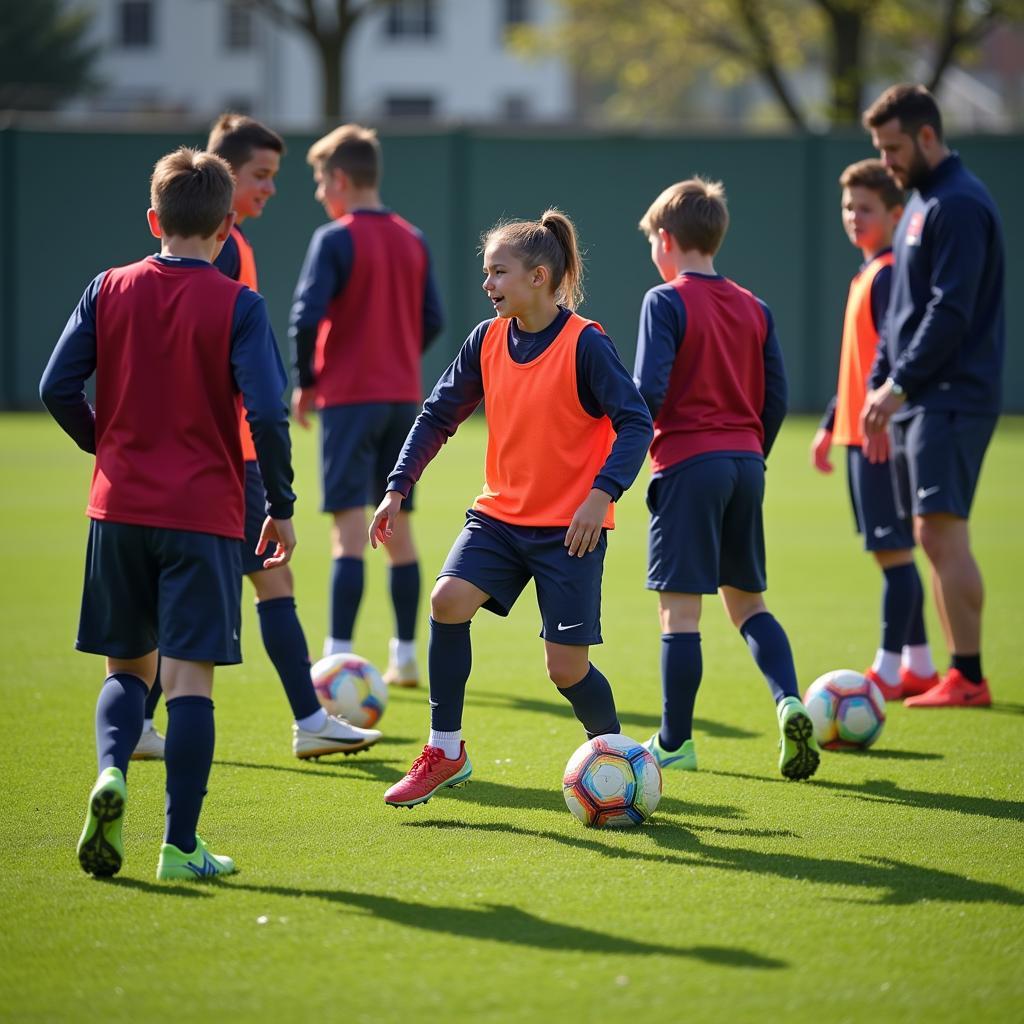Clubs That Don’t Buy Players: A Different Approach to Football
December 19, 2024Football is a business, and a big part of that business revolves around buying and selling players. However, some clubs choose a different path, focusing on youth development and internal growth instead of splashing the cash on big-name signings. These clubs that don’t buy players, or at least do so very sparingly, often operate under a unique philosophy, raising intriguing questions about the modern game.
Why Some Clubs Don’t Buy Players
Several factors can contribute to a club’s decision to abstain from the transfer market. Financial constraints are a significant driver. Smaller clubs, particularly those in lower leagues, might lack the resources to compete with the financial powerhouses. This necessitates a focus on nurturing young talent within their own academies.
 Young players training at a club's youth academy
Young players training at a club's youth academy
Another key reason is a commitment to a long-term vision. Building a team from the ground up, focusing on youth development, can create a stronger sense of identity and unity. Players who come through the ranks are often more invested in the club’s success. This approach can sometimes yield impressive results, as evidenced by several clubs across Europe.
The Benefits and Challenges of Not Buying Players
There are definite advantages to prioritizing internal growth over external acquisitions. One of the most significant is cost-effectiveness. Developing your own players is considerably cheaper than competing for established stars in the transfer market. This can free up funds to invest in other areas of the club, such as infrastructure improvements.
Another benefit is the increased sense of community and fan loyalty. Fans are more likely to connect with players who have risen through the ranks, fostering a stronger bond between the team and its supporters. However, this strategy also presents some significant challenges.
One of the main hurdles is the time required to see results. Building a competitive team solely through youth development takes patience and long-term planning. It can be difficult to compete with clubs that are constantly injecting new talent through big-money signings. There’s also the risk of losing promising young players to wealthier clubs, a constant concern for smaller teams that develop talent.
Famous Examples of Clubs That Rarely Buy Players
Perhaps the most well-known example of a club that rarely buys players is Athletic Bilbao in Spain. They have a long-standing policy of only fielding players of Basque descent. This has forced them to focus on their youth academy, producing a steady stream of talented players over the years.
Another example is FC Barcelona’s famed La Masia academy, which has nurtured some of the greatest footballers of all time, including Lionel Messi. While Barcelona does make big signings, their commitment to youth development remains a core part of their identity.
The Future of Player Acquisition in Football
While the big-money transfers continue to dominate headlines, the success of clubs prioritizing internal growth offers an alternative model. Perhaps we’ll see a shift in the future, with more clubs recognizing the long-term benefits of developing their own talent.
In conclusion, clubs that don’t buy players, or at least do so sparingly, represent a different approach to football. While the challenges are undeniable, the potential rewards, both financially and in terms of team unity, are significant. This strategy, while less glamorous than splashing cash on superstars, offers a sustainable and often rewarding path to success.
FAQs
- Why do some clubs avoid buying players? Often due to financial constraints or a commitment to long-term youth development.
- What are the benefits of not buying players? Cost-effectiveness and increased fan loyalty are key advantages.
- What are the challenges of this approach? It can take time to see results and there’s a risk of losing young players to bigger clubs.
- Which clubs are known for rarely buying players? Athletic Bilbao and FC Barcelona’s La Masia academy are notable examples.
- Could this strategy become more common in the future? The success of some clubs suggests it could be a viable model for others.
- Is it completely impossible for these clubs to buy players? No, but they prioritize internal development and only buy players under very specific circumstances.
- Can a club that doesn’t buy players be successful? Yes, several clubs have proven that this approach can lead to success, although it requires careful planning and patience.
Need support? Contact us at Phone: 0396443476, Email: [email protected] or visit us at 23 Tháng 3, Đắk Nia, Gia Nghĩa, Đắk Nông, Việt Nam. We have a 24/7 customer service team.